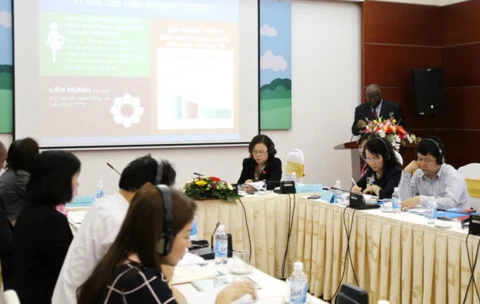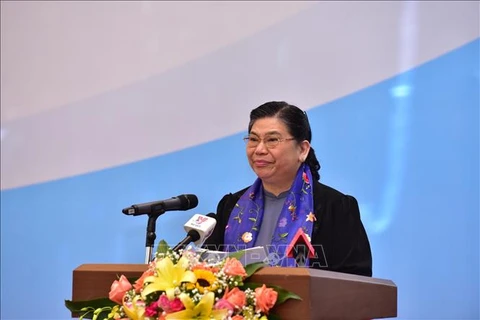 Children are present the closing session of the 2019 Asia-Pacific Regional Conference on Early Childhood Development in Hanoi on December 6 to witness the adoption of the Hanoi Call for Action. (Photo: VietnamPlus)
Children are present the closing session of the 2019 Asia-Pacific Regional Conference on Early Childhood Development in Hanoi on December 6 to witness the adoption of the Hanoi Call for Action. (Photo: VietnamPlus)
Hanoi (VNA) - The Asia-Pacific Regional Conference on Early Childhood Development (ECD) adopted a Hanoi Call for Action on the implementation of ECD during its closing session in Hanoi on December 6.
The call is expected to contribute significantly to accelerating the effective realisation of ECD in each country in the region in the near future.
The Hanoi Call for Action affirms the importance of a sustainable environment in achieving development aspirations globally, in the region, in each country and locality, and in shaping scopes and directions for child development in the Asia-Pacific region.
It also highlights the need to prioritise the investment of resources in children in order to build a solid foundation for a strong socio-economic development in the region, in accordance with the objectives of the United Nations Convention on the Rights of the Child, the Sustainable Development Goals and countries’ development plans.
The document calls for commitments from governments and parliaments to coordinate to ensure the comprehensive development of children and mobilise support from all relevant sectors to promote the goals of child care and nourishment.
It clearly states the unity in interdisciplinary coordination to promote a safe, sustainable and continuous nurturing environment for children through many specific activities concerning the policy environment, the physical environment, the community environment and the home environment.
Delegates will review the progress of implementing the call’s contents and raise their ideas at the Asia-Pacific Regional Conference on ECD in 2020.
Addressing the closing session, Deputy Minister of Labour, Invalids and Social Affairs Le Van Thanh said this is the first regional conference to co-build and adopt a call for action in implementing ECD in the region under the witness of children.
He expressed his hope that the Hanoi Call for Action will be chosen as a priority concerning solutions and actions that need to be accelerated, while serving as an important foundation for ECD cooperation between countries in the Asia-Pacific region.
Themed “Working across sectors to promote nurturing and sustainable environments for young children”, the 2019 Asia-Pacific Regional Conference on ECD gathered more than 500 experts from 35 countries and territories along with 44 international organisations.
The three-day conference aimed to raise awareness among policymakers and practitioners of the substantial threats to children’s present and future environments, as well as opportunities to protect these environments.
Karin Hulshof, Regional Director UNICEF East Asia and Pacific, highlighted the devastating link between the effects of climate change, environmental degradation and the development of children.
The World Health Organisation has reported that 7 million children die of air pollution-related diseases per year and nine out of 10 breathe air not fit for human consumption.
The poor environmental conditions damage children’s health and obstruct their cognitive development.
“The extreme climate events and environmental challenges are not distributed evenly. They adversely affect the youngest and most vulnerable populations,” she said. “In other words, those who have the least are hit the hardest.”
The regional UNICEF leader cited the Lancet Countdown 2019 report published in mid-November which stressed “a child born today will experience a world that is more than four degrees warmer than the pre-industrial average, with climate change impacting human health from infancy and adolescence to adulthood and old age”.
ARNEC Board Chair Sheldon Shaeffer said risks emerging from climate change made children more vulnerable to poverty, toxic stress, insecurity and mortality.
“Besides fixing existing problems, we have to take children into consideration in the process of urban planning and policymaking to make sure we will do the right thing in the future,” he said.
The loss of livelihoods due to climate change and rapid urbanisation also lead to young adults leaving their children behind to seek economic opportunities in cities.
“While this transition often offers families better access to health and education amenities, so too can it pose new risks and challenges – especially when it requires governments to respond to the rapid increase in demand for basic services,” said Hulshof./.























